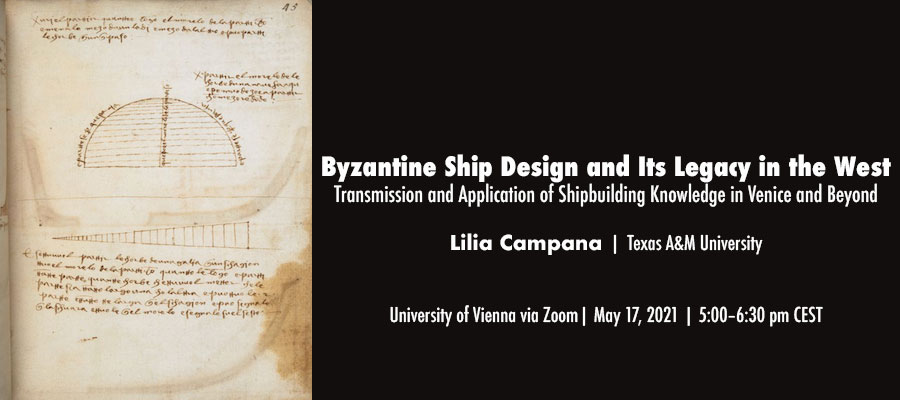Byzantine Ship Design and Its Legacy in the West: Transmission and Application of Shipbuilding Knowledge in Venice and Beyond, lecture by Lilia Campana (Texas A&M University), University of Vienna via Zoom, May 17, 2021, 5:00–6:30 pm CEST
The Wittgenstein Project Team will host a virtual lecture and discussion with Lilia Campana. After a 45-minute lecture by Dr. Campana, there will be time for discussion, moderated by Prof. Dr. Claudia Rapp.
In the Eastern Mediterranean, the period spanning from the 7th to the 11th century was a time of considerable progress in the technology of ship construction. Archeological data from Byzantine shipwrecks document the transition from shell–first to skeleton–first construction, suggesting the use of whole–moulding methods, a new, revolutionary ship design process devised by Byzantine shipwrights based on Euclidean geometry to produce superior vessels. Fourteenth–century Venetian maritime manuscripts provide the earliest textual and visual evidence for Byzantine whole–moulding methods, implying that, by the Late Middle Ages, they were adopted by the shipyards of European maritime states. Completely revolutionizing ship construction concepts, Byzantine whole–moulding methods created sturdier ships, able to safely cross oceans, eventually launching Europe into the Age of Exploration.
Dr. Lilia Campana is a maritime and naval historian of the medieval and early modern Mediterranean, specializing in the history of shipbuilding technology, with a focus on the application of ancient mathematics, geometry, and mechanical arts in ship design. Her research on Byzantine shipbuilding and ship design is supported by the Archaeological Institute of America, the Dumbarton Oaks Research Library & Collections, the American Council of Learned Societies, and the Gladys Krieble Delmas Foundation. She is currently an Affiliated Scholar at the Institute of Nautical Archaeology at Texas A&M University.
Advance registration required.
